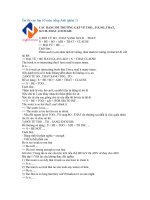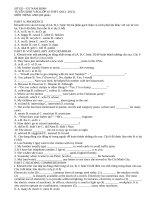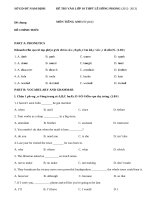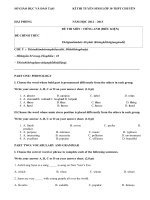Đề thi môn tiếng anh vào lớp 10 chuyên Lê Hồng Phong tỉnh Nam Định năm 2012
Bạn đang xem bản rút gọn của tài liệu. Xem và tải ngay bản đầy đủ của tài liệu tại đây (117.46 KB, 5 trang )
S GD-T NAM NH
THI VO LP 10 THPT Lấ HNG PHONG (2012- 2013)
chung
MễN TING ANH (90 phỳt)
CHNH THC
PART A: PHONETICS
Khoanh tròn vào từ mà phần gạch chân có cách phát âm khác với các từ còn lại. (1.0đ)
1. A. dark
B. park
C. warm
D. spark
2. A. about
B. sound
C. bought
D. loud
3. A. character
B. church
C. armchair
D. kitchen
4. A. kids
B. roofs
C. banks
D. hats
5. A. needed
B. decided
C. wanted
D. looked
PART B: VOCABULARY AND GRAMMAR
I. Chọn 1 phơng án đúng trong số A,B,C hoặc D để điền vào chỗ trống. (1.0đ)
1. I havent seen John _______ he got married.
A. when
B. until
C. since
D. before
C. assistant
D. instructor
2. Tom works as a shop __________ in a big store.
A. attendant
B. brother
3. You neednt do that when the maid is here, ________?
A. do you
B. need you
C. is she
D. isnt she
4. Last year he visited the town _______ he was born in.
A. who
B. whom
C. what
D. which
C. not making
D. dont make
5. The librarian asked us _________ so much noise.
A. not to make
B. no make
6. They broadcast the victory news over powerful loudspeakers __________ the whole town could hear it.
A. however
B. although
C. because
D. so that
7. If I were you, __________ phone and tell her you’re going to be late.
A. I’ll
B. I’d have
C. I would
D. I
8. It was ________hot day that we decided to leave work early.
A. such
B. so
C. so a
D. such a
9. Most people were no longer listening to his ________ story.
A. boring
B. tired
C. interesting
D. suprised
10. ________ it was raining heavily, we went out without a raincoat.
A. In spite of
B. Although
C. However
D. Despite
II. Cho d¹ng ®óng cña tõ trong ngoÆc. (0.5®)
1. What is your ___________________ type os holiday? (favor)
2. “Please read this test ________________.” (care)
3. Many people still believe that smoking is ______________. (harm)
4. If you want to attend the the course, you must pass the written _______________. (examine)
5. Solar energy doesn’t cause ______________ . (pollute)
III. Cho d¹ng ®óng cña ®éng tõ trong ngoÆc. (1.0®)
1. When her mum came home, she (study) ___________________ in her room.
2. I (give) ________________ you the money if I had it.
3. “When did you come here?” -” I (be) _______________ here since August 25.”
4. They (start) ____________ building a five-star hotel last year.
5. When I was small, my grandmother used (take) ________________ me to school every day.
III. §iÒn vµo chç trèng 1 giíi tõ thÝch hîp ®Ó hoµn thµnh nh÷ng c©u sau. (0.5®)
1. John arrives __________ Singapore on Monday evening.
2. They have been married __________ three months.
3. David is going to hold his birthday party __________ June 15th.
4. It rained for three days __________ stopping.
5. If we go __________ littering, the environment will become seriously polluted.
PART C: READING COMPREHENSION
I. Đọc kĩ đoạn văn và làm theo yêu cầu. ( 1.6đ )
On December 26, 2004 there was a terrible disaster. Indonesia, Thailand, India, Sri Lanka, Maldives and
other places were struck by the disaster. This tsunami killed over 300.000 people. Indonesia suffered the
most damage and the greatest loss of lives.
Tsunami is a Japanese word. This word means harbor wave. Tsunami is now used internationally to
refer a series of waves traveling across the ocean with extremely long wavelengths. When these waves
approach shore, the speed of the wave decreases as they begin to feel the bottom. It is at this time that the
height of the wavedrastically increases.
When the earths crust under or near the ocean suddenly rises or falls, this creates a rise or fall in the
level of the ocean. This rise or fall in sea level is the initial formation of a tsunami wave. Tsunamis can
also be created by volcanic activity and landslides occurring above or below the sea surface.
A. Tr li cỏc cõu hi sau.
1. What disaster occurred on December 26, 2004?
____________________________________________________________________________________
2. Which country was most seriously affected?
_____________________________________________________________________________________
3. Where does the word tsunami come from?
_____________________________________________________________________________________
4. What causes tsunami waves?
_____________________________________________________________________________________
B. Khoanh trũn vo ỏp ỏn ỳng trong s A, B, C hoc D.
5. How many countries were affected by the tsunami occurred on December 26, 2004?
A. 1
B. 3
C. 5
D. More than 5
6. What is tsunami?
A. A wave in the sea.
B. waves that do not cause destruction.
C. A series of waves traveling across the ocean with extremely long wavelengths.
D. A rise or fall in the level of the ocean.
7. What happened when the waves approach shore?
A. Their speed and height increase.
B. Their speed increases and their height reduces.
C. They slow down but rise dramatically.
D. They become much faster because they feel the bottom.
8. Which of the following best replace the word drastically in the passage?
A. seriously
B. dangerously
C. considerably
D. slightly
II. Điền vào chỗ trống 1 từ thích hợp. ( 1.4đ )
Switzerland is a small country (0) in Central Europe. The total land area of this tiny (1)
. is only 15,941 square miles (41,288 km2 ). Its estimated population in 1984 was 6,392,000.
Because thhis nation is small, you might think that there is only one national (2). However,
you would be wrong because there are three official languages which (3) .. German, French and
Italian. As a result, Switzerland has three official names: Schweiz (in German), Suisse (in French), (4)
Swizzera (in Italian). All national laws are published in these languages. If you look on Swiss
coins (5) . Postage stamps, you (6) not find the name for this country in any of the
national languages. (7)., you will find the word Helvetia, the Latin name for this country.
PART D: WRITING
I. Viết lại các câu sau bắt đầu bằng từ gợi ý sao cho câu thứ hai có cùng nghĩa với câu thứ nhất.
(2.0đ)
1. People dont use this dictionary very often.
-> This dictionay
2. I dont have time to help you do this work.
-> I wish
3. Is spite of taking a taxi, he was still late for the party.
-> Although..
4. We spent a whole day looking for these old pictures.
-> It took..
5. I havent visited my parents for three months.
-> I last.
6. Its very convenient to wear jeans at work.
-> Wearing jeans at work
7. Do you have many friends? she asked.
-> She asked me…………………………………………………………………………………………..
8. She isn’t old enough to decide for herself.
-> She is so………………………………………………………………………………………………..
9. Why don’t you meet him to discuss the pay order?
-> I suggest………………………………………………………………………………………………..
10. There is too much traffic so the air is polluted.
-> If there…………………………………………………………………………………………………
II. ViÕt thµnh c©u hoµn chØnh sö dông nh÷ng tõ vµ côm tõ gîi ý cho s½n. (1.0®)
1. His car / run / fast / than mine.
………………………………………………………………………………………………………………
………………………………………
2. I / used / go / bed / early / when / I / a boy.
………………………………………………………………………………………………………………
………………………………………
3. She / wish / she go / theater / me / tonight.
………………………………………………………………………………………………………………
………………………………………
4. It / a month / since / write / you.
………………………………………………………………………………………………………………
………………………………………
5. you / able / get / good job / if / you / speak English / fluent.
………………………………………………………………………………………………………………
………………………………………
THE END









